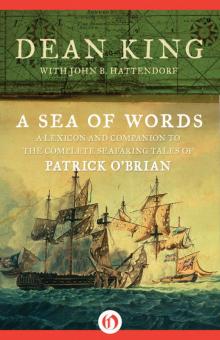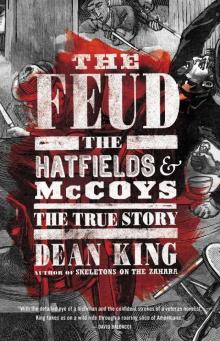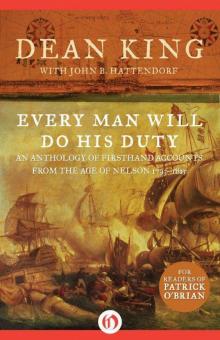Every Man Will Do His Duty Read online
Page 12
The Spanish admiral’s plan seemed to be to join his ships to leeward, by wearing round the rear of our line; and the ships which had passed and exchanged shots with our squadron had actually borne up with this view.
This design, however, was frustrated by the timely opposition of Commodore Nelson, whose place in the rear of the British line afforded him an opportunity of observing this maneuver, and of penetrating the Spanish admiral’s intention. His ship, the Captain, had no sooner passed the rear of the enemy’s ships that were to windward, than he ordered her to wear, and stood on the other tack towards the enemy.
In executing this bold and decisive maneuver, the commodore reached the sixth ship from the enemy’s rear, which was the Spanish admiral’s own ship, the Santissima Trinidad, of 136 guns, a ship of four decks, and said to be the largest in the world. Notwithstanding the inequality of force, the commodore instantly engaged this colossal opponent, and for a considerable time had to contend not only with her, but with her seconds a-head and a-stern, of three decks each. While he maintained this unequal combat, which we viewed with admiration mixed with anxiety, his friends were flying to his support; and the enemy’s attention was soon directed to the Culloden, Captain Troubridge, and in a short time after to the Blenheim, of 90 guns, Captain Frederick, who opportunely came to their assistance.
The intrepid conduct of the commodore staggered the Spanish admiral, who already appeared to waver in pursuing his intention of joining the ships cut off by the British fleet, when the Culloden’s arrival, and Captain Troubridge’s spirited support of the Captain, together with the approach of the Blenheim, followed by Rear-Admiral Parker, with the Prince George, Orion, Irresistible, and Diadem, not far distant, determined the Spanish admiral to change his design altogether, and to make the signal for the ships of his main body to haul their wind, and make sail on the larboard tack.
Advantage was now apparent in favor of the British squadron, and not a moment was lost in improving it. As the ships of Rear-Admiral Parker’s division approached the enemy’s ships, in support of the Captain and her gallant seconds, the Blenheim and Culloden, the cannonade became more animated and impressive. The superiority of the British fire over that of the enemy, and its effects on the enemy’s hulls and sails, were so evident that we in the frigate no longer hesitated to pronounce a glorious termination of the contest.
The British squadron at this time was formed in two divisions, both on the larboard tack; their situation was as follows: Rear-Admiral Parker, with the Blenheim, Culloden, Prince George, the rear-admiral’s ship, Captain, Orion, Irresistible, composed one division, which was engaged with the enemy’s rear. Sir John Jervis, with the other division, consisting of the Excellent, Victory, Barfleur, Namur, Egmont, Goliath, and Britannia, was pressing forward in support of his advanced squadron, but had not yet approached the real scene of action.
Stage 1: Just after 12:00 noon
A. British fleet passing through the enemy’s line.
B. Culloden tacking to engage the enemy’s main body to windward.
C. Main body of the Spanish fleet, which, after passing the British fleet on the larboard tack, bore up with an apparent design of joining their ships to leeward.
D. Spanish ships cut off from their main body, attempting to join their friends, but obliged to wear and sheer off by the superior force of the British fire.
E. A Spanish line-of-battle ship, which succeeded in joining the main body.
F. The British frigates exchanging fire with the Spanish two-decker as she passed the rear of the British line.
G. A large ship, which at the commencement of the action set all sail and soon disappeared to leeward.
Stage 2: About 12:45 P.M.
A. The main body of Spanish fleet hauling wind on larboard tack and making sail in consequence of spirited attack of Nelson, in Captain, 74, supported by Culloden, 74, Captain Troubridge.
B. Captain engaged with Santissima Trinidad, 136, and two other three-decked ships, which were seconds to the Spanish Admiral.
C. Culloden, engaged with the rear ships on the enemy’s main body.
D. Blenheim, a three-decker of 90 guns, commanded by T. L. Frederick, advancing to the assistance of Captain and Culloden.
E. Rear-Admiral W. Parker, in Prince George, 98; with Orion, 74; Irresistible, 74; and Diadem, 64, approaching to support attack on center and rear of the enemy’s fleet.
F. Colossus, Captain G. Murray, disabled by the loss of her fore-yard and fore-topsail-yard.
G. Spanish ships that tried to rejoin fleet but were obliged to sheer off and made all sail to south.
Stage 3: About 3:45 P.M.
A. Rear division of British fleet: 1) Britannia, 2) Goliath, 3) Barfleur, 4) Victory, 5) Namur, 6) Excellent, 7) Egmont, covering prizes and injured ships of advanced division, against the enemy’s fresh ships, which have arrived to support their admiral-in-chief.
B. Santissima Trinidad striking or about to.
C. Two line-of-battle ships wearing, on the arrival of fresh ships, to support their Chief.
D. Captain, entangled with her two prizes, Nicolas and San Josef.
E. Diadem, 64, and Minerva frigate assisting Captain, to disengage her from her prizes.
F. Colossus.
G. Lively frigate towing San Ysidro, the first Spanish ship that struck.
H. Salvador del Mondo attended by Bonn Citoyenne.
The Colossus having, in the early part of the day, unfortunately lost her fore-yard and fore-top-sail-yard, was obliged, in consequence of these losses, to fall to leeward, and the Minerve’s signal was made to take her in tow, which was, however, handsomely declined by Captain Murray when the Minerve had come within hail in execution of her orders.
While the British advanced division warmly pressed the enemy’s centre and rear, the admiral meditated, with his division, a co-operation, which must effectually compel some of them to surrender.
In the confusion of their retreat, several of the enemy’s ships had doubled on each other, and in the rear they were three or four deep. It was therefore the British admiral’s design to reach the weathermost of these ships, then bear up, and rake them all in succession with the seven ships composing his division. His object afterwards was to pass on to the support of his van division, which, from the length of time they had been engaged, he judged might be in want of it. The casual position, however, of the rear ships of his van division, prevented his executing this plan: the admiral, therefore, ordered the Excellent, the leading ship of his own division, to bear up; and, with the Victory, he himself passed to leeward of the enemy’s rearmost and leeward most ships, which, though almost silenced in their fire, continued obstinately to resist the animated attacks of all their opponents.
Captain Collingwood, in the Excellent, in obedience to the admiral’s orders, passed between the two rearmost ships of the enemy’s line, giving to the one most to windward, a seventy-four, so effectual a broadside that, with what she had received before, her captain was induced to submit. The Excellent afterwards bore down on the ship to leeward, a three-decker; but observing the Orion engaged with her, and the Victory approaching her, he threw into her only a few discharges of musketry and passed on to the support of the Captain, at that time warmly engaged with a three-decker carrying a flag. His interference here was opportune, as the continual and long fire of the Captain had almost expended the ammunition she had at hand, and the loss of her fore-top-mast, and other injuries she had received in her rigging, had rendered her nearly ungovernable.
The Spanish three-decker had lost her mizenmast; and before the Excellent arrived in her proper station to open on this ship, the three-decker dropped astern aboard of, and became entangled with, a Spanish two-decker that was her second: thus doubled on each other, the Excellent gave the two ships her fire, and then moved forwards to assist the headmost ships in their attack on the Spanish admiral and the other ships of the enemy’s centre.
Meanwhile, Sir John Jervis, disappoi
nted in his plan of raking the enemy’s rear ships, and having directed, as before observed, the Excellent to bear up, ordered the Victory to be placed on the lee-quarter of the rearmost ship of the enemy, a three-decker, and having, by signal ordered the Irresistible and Diadem to suspend their firing, threw into the three-decker so powerful a discharge that her commander, seeing the Barfleur, carrying Vice-Admiral the Hon. W. Waldegrave’s flag, ready to second the Victory, thought proper to strike to the British chief. Two of the enemy’s ships had now surrendered, and the Lively frigate and Diadem had orders to secure the prizes. The next that fell were the two with which Commodore Nelson was engaged.
While Captain Collingwood so nobly stepped in to his assistance, as has been mentioned before, Captain R. W. Miller, the commodore’s captain, was enabled to replenish his lockers with shot and prepare for a renewal of the fight: no sooner, therefore, had the Excellent passed on than the gallant commodore renewed the battle.
The three-decker with which he was before engaged having fallen aboard her second, that ship, of84 guns, became now the Captain’s opponent. To her Commodore Nelson directed a vigorous fire; nor was it feebly returned, as the loss of the Captain evinced, near twenty men being killed and wounded in a very few minutes. It was now that the various damages already sustained by that ship through the long and arduous conflict which she had maintained, appearing to render a continuance of the contest in the usual way precarious, or perhaps impossible; and the commodore not bearing to part with an enemy of whom he had assured himself, he instantly resolved on a bold and decisive measure, and determined, whatever might be the event, to attempt his opponent sword in hand. The boarders were summoned and orders given to lay the Captain on board the enemy.
Fortune favors the brave; nor on this occasion was she unmindful of her favorite. Captain Miller so judiciously directed the course of the Captain that she was laid aboard the starboard quarter of the eighty-four gun ship, her spritsail yard passing over the enemy’s poop, and hooking her mizen shrouds; and the word to board being given, the officers and seamen destined for this duty, headed by Lieutenant Berry, together with the detachment of the 69th regiment, commanded by Lieutenant Pearson, then doing duty as Marines on board the Captain, passed with rapidity on board the enemy’s ship; and in a short time the San Nicolas was in the possession of her intrepid assailants. The commodore’s impatience would not permit him to remain an inactive spectator of this event. He knew the attempt was hazardous; and his presence, he thought, might contribute to its success. He therefore accompanied the party in this attack, passing from the fore chains of his own ship into the enemy’s quarter gallery, and thence through the cabin to the quarterdeck, where he arrived in time to receive the sword of the dying commander, who was mortally wounded by the boarders. For a few minutes after the officers had submitted, the crew below were firing their lower-deck guns: this irregularity, however, was soon corrected, and measures taken for the security of the conquest. But this labor was no sooner achieved, than he found himself engaged in another and more arduous one. The stern of the three-decker, his former opponent, was directly amidships on the weather-beam of the San Nicolas; and, from her poop and galleries, the enemy sorely annoyed, with musketry, the British on board the San Nicolas. The commodore was not long in resolving on the conduct to be observed upon this momentous occasion. The alternative that presented itself, was to quit the prize, or advance. Confident in the bravery of his seamen, he determined on the latter. Directing therefore an additional number of men to be sent from the Captain, on board the San Nicolas, the undaunted commodore headed himself the assailants in this new attack, and success crowned the enterprise. Such, indeed, was the panic occasioned by his preceding conduct that the British no sooner appeared on the quarter-deck of their new opponent than the Commandant advanced, and asking for the British commanding officer, dropped on one knee and presented to him his sword; making, at the same time, an excuse for the Spanish admiral’s not appearing, as he was dangerously wounded. For a moment Commodore Nelson could scarcely persuade himself of this second instance of good fortune; he therefore ordered the Spanish Commandant, who had the rank of a brigadier, to assemble the officers on the quarter-deck, and direct steps to be taken instantly for communicating to the crew the surrender of the ship. All the officers immediately appeared, and the commodore found the surrender of the San Josef ascertained, by each of them delivering to him his sword.
The coxswain of Nelson’s barge had attended him throughout this perilous adventure. To his charge the commodore gave the swords of the Spanish officers as he received them; and the jolly tar, as they were delivered to him, tucked these honorable trophies under his arm, with all the sang-froid imaginable.
It was at this moment also that an honest Jack Tar, an old acquaintance of Nelson’s, came up to him in the fullness of his heart, and excusing the liberty he was taking, asked to shake him by the hand, to congratulate him upon seeing him safe on the quarter-deck of a Spanish three-decker.
This new conquest had scarcely submitted, and the commodore returned on board the San Nicolas, when the latter ship was discovered to be on fire in two places. At the first moment appearances were alarming; but presence of mind and resources were not wanting to the British officers in this emergency. The firemen were immediately ordered from the Captain; and proper means being taken, the fires were soon got under.
A signal was now made by the Captain for boats to assist in separating her from her prizes; and as the Captain was incapable of further service until refitted, the commodore hoisted his pendant, for the moment, on board the Minerve frigate, and in the evening removed it to the Irresistible, Captain Martin.
Four of the enemy’s ships were now in [the] possession of the British squadron (two of three decks, the Salvador del Mondo and the San Josef, of 112 guns each; one of 84, the San Nicolas; and the San Ysidro, of 74 guns;) and the van of the British line still continued to press hard the Santissima Trinidad and others in the rear of the enemy’s flying fleet. The approach, however, of the enemy’s ships which had been separated from their main body in the morning, two new ships also bearing down from to windward, and two of the enemy’s flying ships wearing to support their chief, at that time severely pressed, add to which, the closing of the day—these circumstances, but more particularly the lateness of the hour, while the prizes were not yet properly secured, determined the British admiral to bring to. The headmost of the enemy’s approaching ships (in all nine in number, two of which were of three decks) had indeed advanced to fire on the Britannia, in which Vice-Admiral Thompson carried his flag, and the sternmost ships of the rear-division, which were fortunately, at this period, in a situation to keep the enemy in check. The Victory likewise, with the Barfleur and Namur, had formed to cover the prizes. The British admiral, therefore, a little before four o’clock, p.m., made the preparative, and soon after the signal for the British fleet to bring to. The enemy’s fresh ships, on approaching, opened afire on our covering ships; but, though both fresh, and so superior in numbers, they contented themselves with the noise of a few irregular broadsides, leaving their captured friends, and seeming too happy to be allowed to escape with their discomfited chief, and his disabled companions, to think of molesting our squadron in bringing to on the starboard tack.
The frigates having orders to take in charge the prizes not already taken possession of, the four were soon secured as well as circumstances permitted; and the Captain having suffered very considerably in her masts and rigging, the Minerve was ordered to take her in tow.
At the close of the evening, the British fleet was again formed in most admirable line of battle, on a wind with their heads to the southward, and the Niger frigate ordered to look out during the night.
The close of the day, before the four prizes were secured, undoubtedly saved the Spanish admiral’s flag from falling into the hands of the victors. The Santissima Trinidad, in which he carried it, had been so much the object of attention that the ship was a perfect
wreck when the action ceased. Many indeed aver that she actually struck both her flag and ensign, hoisting a flag as a signal of submission; but as she continued her course, and afterwards hoisted a Spanish jack, others doubt this circumstance. It is however, a truth that her fire had been silent for some time before this event is reported to have occurred.
The loss of the enemy in this engagement must have been very considerable. The fire of the British squadron was, throughout the action, superior in the proportion of five or six to one; and if we were to judge from the number of killed and wounded found on board the prizes, their casualties must greatly exceed the numbers that have been usually computed. Almost all their wounded that had lost limbs died for want of assistance; and many others, who were wounded in other parts, were found dead in the holds.
The loss of the British squadron, in killed and wounded, amounted to exactly three hundred: moderate indeed, when compared with that of the enemy, and considering the duration of the action! But the expenditure of ammunition was, I am told, beyond any recent example. The Culloden expended, it is said, one hundred and seventy barrels of powder; the Captain, one hundred and forty-six; and the Blenheim, one hundred and eighty; other ships expended in the same proportion. It is not unworthy of remark also that not a single gun in the British squadron burst in this action.
The Captain fired more shot than are usually given to a ship of her rate, at her first equipment in England; and it was observed, that when shot or grape were wanting on board this ship for the carronades, the tars substituted in their place nine-pounds shot, seven of which were frequently discharged at one time, and then at so short a distance that every shot of the seven must have had effect.
If I may be permitted to hazard an opinion, the whole squadron have gained immortal honor; for the victory of the 14th of February stands, in all its circumstances, first and unparalleled in naval history.

 A Sea of Words
A Sea of Words Skeletons on the Zahara
Skeletons on the Zahara The Feud: The Hatfields and McCoys: The True Story
The Feud: The Hatfields and McCoys: The True Story Every Man Will Do His Duty
Every Man Will Do His Duty 9/11...The Tragic Story of the Day that Changed America: The Terror, The Horror and The Heroes
9/11...The Tragic Story of the Day that Changed America: The Terror, The Horror and The Heroes White Slave Cop
White Slave Cop Skeletons on the Zahara: A True Story of Survival
Skeletons on the Zahara: A True Story of Survival